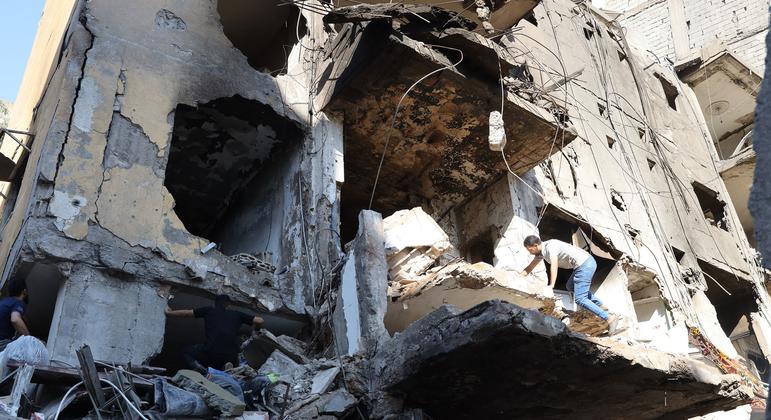The Lebanese capital has been rocked by another night of strikes and ongoing attacks, as aid workers continue to brave the dangers to help those in need. Despite their own families being displaced and searching for safety, humanitarian workers are on the frontlines of the crisis, providing assistance to those affected by the violence. Imran Riza, the UN’s top humanitarian coordinator in Lebanon, expressed the challenges they are facing, stating, “Another sleepless night in Beirut. Counting the blasts shaking the city. No warning sirens. Not knowing what’s next. Only that uncertainty lies ahead. Anxiety and fear are omnipresent.”
The situation in Lebanon remains dire, with the UN migration agency, IOM, reporting that 1,600 lives have already been lost and 6,000 others injured in recent days. The need to protect civilians is paramount, with IOM emphasizing the importance of continued support to provide assistance to those affected by the conflict. The World Health Organization (WHO) also issued a warning, with Tedros Adhanom Ghebreyesus stating that the death toll is rising and hospitals are overwhelmed with the influx of injured patients.
Amidst the chaos, aid teams are working tirelessly to provide help to the approximately one million people who have been displaced so far. The UN refugee agency, UNHCR, highlighted the devastating humanitarian toll of the conflict, with Israeli attacks continuing to displace thousands. The international community is urged to step up and provide support to ensure that those caught up in the hostilities receive the basic necessities such as food, hygiene, and medical care.
Ivo Freijsen from UNHCR Lebanon emphasized the trauma and anxiety experienced by those affected by the conflict. One young woman, Nancy, described the scenes around her as terrifying, expressing the constant fear of death. Another displaced Lebanese woman, Muna, recounted the harrowing experience of fleeing her home amidst multiple explosions.
Communities in southern Lebanon have also been forced to flee the escalating conflict, with stories of fear and uncertainty emerging from those affected. Zeinab and Fatima, who were preparing to go to school for an exam, found themselves in the midst of shelling and feared for their lives as their house shook from the impact of the blasts.
Children have been particularly impacted by the conflict, with UNICEF on the ground providing essential services such as water, health, nutrition, education, and psycho-social support to help them cope with the trauma they have experienced. The organization is working tirelessly to reach countless children across Lebanon and ensure they receive the assistance they need during this challenging time.
The World Food Programme (WFP) has also been actively providing aid to the newly displaced population, reaching nearly 130,000 people with hot meals, food parcels, bread, sandwiches, and emergency cash assistance. The urgent need for support in Lebanon is evident, with humanitarian agencies working tirelessly to provide aid to those affected by the conflict.
As the security situation in Lebanon remains volatile, the international community must continue to support humanitarian efforts to ensure that those affected by the conflict receive the assistance they need to rebuild their lives and recover from the trauma they have experienced. The resilience of the Lebanese people in the face of adversity is a testament to their strength and determination to overcome the challenges they are currently facing.









